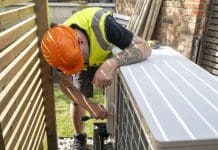The NHBC Foundation has published a new report looking at one of the critical aspects that housebuilders and developers will need to consider as the UK aims to achieve net zero greenhouse gas emissions
The new report, ‘Plugging in to the future – electric vehicle charging and new homes’, gives advice and guidance to housebuilders on the key issues which need to be considered on all new developments.
The government has stated that the UK should achieve net zero greenhouse gas emissions by 2050 and has put many policies in place, including that by 2035 all new cars and vans should be fully zero emissions, as a result, electric vehicles (EVs) will become increasingly common.
This will have significant implications for housebuilders, planners and architects since the resulting increase in electric vehicles will require homes to be provided with the necessary equipment for residents to charge their EVs where they live.
The report urges housebuilders to engage with the relevant Distribution Network Operator (DNO) at the very earliest stage to ensure that the electrical supply to the site has sufficient capacity for the number of charge points being installed and to carefully consider the location of the points.
‘Plugging in to the future – electric vehicle charging and new homes’ also examines the various types of EVs currently available and the different connecting cables and charge points being deployed.
Meeting the government’s ambition of net zero emissions by 2050
Richard Smith, NHBC’s head of standards, innovation and research, said: “We believe our new report will act as essential advice for housebuilders, developers and architects in what is unquestionably a fast-moving context. The industry will need to be ready to face into the many challenges related to charging points and EVs over the coming years as new petrol and diesel cars begin to be phased out.
“It is without doubt a sizeable challenge to meet net zero emissions. It is estimated that the UK needs more than 4 million EV charge points by 2030, from a figure of around only 182,000 just two years ago.
“We hope that this new report will help the housebuilding industry on its journey in helping to meet the government’s ambition of net zero emissions by 2050.”
Download the free report here.

















